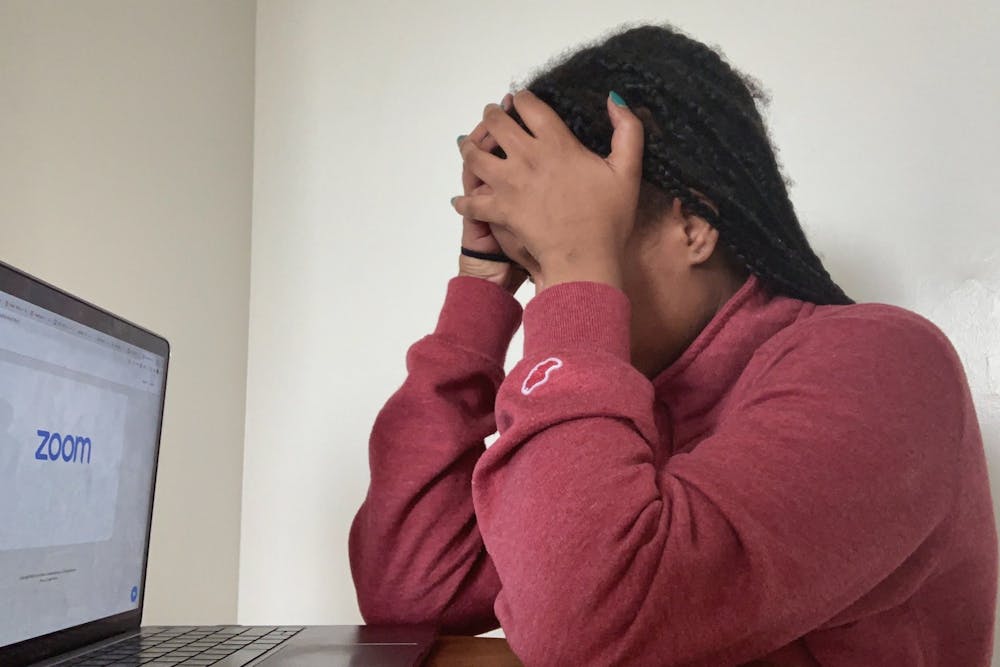
Three weeks into Penn’s first entirely-online semester, students are feeling especially exhausted — even as they take classes from their bedrooms.
After Penn announced it would conduct all classes online for Fall 2020, courses were categorized as synchronous on Zoom, asynchronous recorded lectures, or a mixture of the two. Now, students are feeling tired from staring at their screens all day, and reporting that their courses and coursework take more time and mental energy than they normally would in person.
College sophomore Jenna Schulman spends roughly 10 hours per day on her computer, primarily working on homework and watching pre-recorded lectures. Since asynchronous assignments have added to her workload and decreased direct contact with her professors, Schulman feels increased anxiety about missing assignments.
“If you were to take a summation of all the total time put into the classes per week, I feel like it's a lot more than it would be had they been in person,” College sophomore Walli Chen said.
This fall, Chen is living with six friends in an off-campus house in Philadelphia. She said the opportunity to spend time with her housemates has made online learning less stressful this semester. However, she finds the lack of social interaction from her online classes draining.
Dr. Melissa G. Hunt, Associate Director of Clinical Training in the Department of Psychology, said that one problem with online classes is the loss of incidental opportunities for socialization.
“Usually, as you're packing up your bag and putting your computer away, you might turn to the person next to you and chat a little bit,” Hunt said. “You might even have a little whisper conversation at some point with them if there's someone who's interesting to you or who seems like they might be a friend. And then, often at the end of class, one might say, ‘Hey, I'm planning to take a study break tonight,’ or ‘Gosh, would you like to get together for coffee tomorrow?’ We lose a lot of those opportunities for in-person, real-world communication, when all of our interactions are happening on the screen.”
College sophomore Luke Elegant, along with Chen and Hunt, reported headaches from longer daily periods of screen time. Schulman and Elegant are making efforts to take more frequent walks in between classes, as they’ve found it tiring to sit in one place for back-to-back Zoom sessions.
Elegant noticed that a larger number of his classmates this semester are keeping their cameras on during Zoom classes compared with last spring. He thinks this is because more students are attempting to connect with each other after quarantine isolation.
On Zoom, Hunt recommends that students simulate eye contact with others by looking three to four inches below the camera and make sure their faces are frontlit. She emphasized the importance of hiding one’s own face from view during calls, in order to mitigate potentially draining feelings of self-consciousness.
“Seeing video of ourselves in action is both extremely distracting, and often a little bit demoralizing for people,” Hunt said. “We tend to get very distracted by ‘Oh my God, my hair looks weird,’ or, ‘Why is my shirt bunching up strangely?’ or, ‘I can't believe my face looks like that when I smile.’ So, getting out of our own heads is very important to social interactions not being overly focused on issues of self presentation.”
Schulman and Chen are grateful for the efforts their professors have made to connect with students. For example, Chen said that her chemistry professor is providing additional office hours during the times the course would have met in person.
“These are challenging times,” Hunt said. We are living through a generation-defining crisis right now. And the more we can use good humor and flexibility, the more we can be understanding and generous with the people in our lives, the better off we will all be.”
The Daily Pennsylvanian is an independent, student-run newspaper. Please consider making a donation to support the coverage that shapes the University. Your generosity ensures a future of strong journalism at Penn.
Donate



